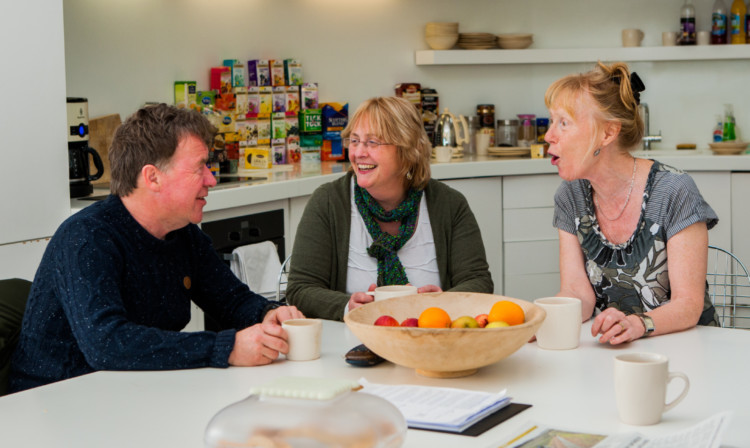With a 12% increase in users last year, a “bursting at the seams” Maggie’s Fife is hoping to develop an extension in the future.
“There was a lot of footfall, well over 8,000, last year and it continues to increase,” said centre head Dr Elspeth Salter.
While the kitchen at the heart of the centre is a hub of chat and a tai chi class is getting under way, Dr Salter chatted to The Courier about the vital service provided in the centre.
“Visitor numbers have gone up very much over the last couple of years and we’re bursting at the seams. We are hoping, at some point, to try to develop an extension.”
In the meantime, the small, expert team wants to ensure everyone who needs support be it emotional or practical knows they are welcome. “We are for the whole of Fife, even though we are in Kirkcaldy,” she said.
That extends to anyone affected by cancer, be they patients, families, friends or carers. It could even be someone who is trying to support a loved one in another part of the country and feels they need a friendly ear or to speak to someone who really knows what they are going through. When we first opened this centre, I do not think we really anticipated the level of demand there is for it.
“It is such a benefit for those feeling lost or isolated; here, they can meet others in a similar situation.
“People are looking for community. When something happens to them and they feel they no longer have things in common with people around them, they need for others to understand.”
And that’s where Maggie’s steps in. In particular, Dr Salter said she was delighted to see more men using the centre, which is in the grounds of Victoria Hospital. Last year the centre was involved in a successful pilot with Prostate Cancer UK, aimed at those affected by prostate cancer. Involving the NHS Fife urology department, it was the first time such a course had been run in the UK.
While Maggie’s Fife is about to start the second course, the pilot is now being used in other parts of the country. Maggie’s staff helps entire families and works closely with youngsters who may have to see their mums or dads battle cancer.
Through a range of workshops, they aim to demystify many aspects of treatment, and, of course, the children can chat to other youngsters coping with a similar but very strange situation.
“Once, two little boys were playing on the swivel chairs, and it could have looked like they were messing around, when one asked the other: ‘Do you think my mum’s hair will fall out?’.
“The other said: ‘Of course, my mum’s did but it’s growing back again.’
“And then they went back to swivelling.”
That small exchange speaks volumes as to how Maggie’s helps in all sorts of ways.
“We try to help people feel they can still manage life, as well as deal with cancer, in whatever way is meaningful for them be it practical or emotional challenges,” she said.
“We are as much here for family members as we are for the person with cancer.”
There is a regular family and friends support group where people benefit from meeting up with one another.
Dr Salter said, as a clinical psychologist, she longs for the day when cancer doesn’t exist.
“I utterly dislike cancer the emotional effect it can have on people, the terror it provokes in people. If there is anything I can do to help with that, I will.”
